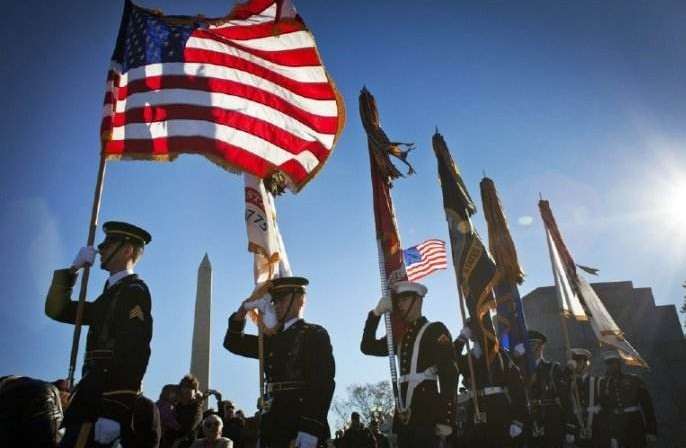(单词翻译:单击)
听力文本
Now the VOA Learning English program Words and Their Stories.
On this show, we explore the origin and uses of common expressions in American English.
Today, we talk about some words that began life in the military.
In the United States, Veterans Day is a national holiday held on November 11. On that day in 1918, all sides in World War I stopped fighting. Americans originally called this holiday Armistice Day. The name changed to Veterans Day in 1954.
A Veteran's Day kind of veteran is a current or former member of the armed services. However, "veteran" also describes civilians.

A veteran is someone who has a lot of experience in a particular activity, skill or job. The opposite of a veteran is a novice or a beginner.
But let's get back to military veterans.
People in the military like to use acronyms. An acronym is a word formed from the first letters of each word in a phrase.
For example, the acronym NATO stands for "North Atlantic Treaty Organization." But now people just call it "NATO."
Some other military acronyms have crossed over into civilian language.
Radar, for example, is short for "RAdio Detecting and Ranging." Radar is a device that sends out radio waves for finding the position and speed of a moving object such as a spy plane. This war term first came into use in 1941.
We use "radar" in a couple useful expressions.
To fall off the radar means to disappear.
For example, let's say I am too busy to play the ukulele. When a friend asks if I've been playing, I can say, "Playing the ukulele has kind of fallen off my radar. I'm just too busy these days."
The opposite of that is to be on someone's radar. When something is on your radar you are thinking about it or considering it.
For example, let's say I have moved to a new city. I have a new job and a new apartment. Then, someone asks me if I have joined a ukulele group yet. I answer, "Not yet. But it is on my radar."
In other words, I am actively looking for one.
But let's leave the ukulele and go back to war. If you are pilot of a spy plane, you want to fly under the enemy's radar. This way they will not detect you on their radar screens.
And that is how we use this expression in everyday conversation. When you fly under the radar you want to be invisible -- unseen, undetected. You disappear.
If you disappear from a battle in a war, you are MIA. This acronym stands for "missing in action."
In civilian use, MIA often refers to a person dropping out of an activity. For example, if I miss a lot of ukulele practices my band mates might describe me as MIA.
AWOL is a very different kind of military disappearance. "AWOL" stands for "absence without official leave." This means a soldier is missing from duty without permission. A solider found guilty of an AWOL charge can suffer serious punishment.
In civilian life, it has a similar meaning. AWOL means you were supposed to be somewhere but were not. For example, if my friend offered to help at my ukulele concert but did not show up, she is AWOL.
Military people have great acronyms to describe a situation that has gone terribly wrong.
FUBAR means something severely disorganized, damaged or ruined. Some say it stands for "fouled up beyond all repair." Other say it stands for "fouled up beyond all recognition."
SNAFU has a similar meaning. This acronym stands for "situation normal: all fouled up." In other words, things are not going well, as usual.
We should note, the soldier who invented these acronyms may not originally have used the word "fouled." They may have used a more offensive word that means the same thing. But that word is just not VOA Learning English style.
I'm Anna Matteo.
I am not MIA or . I am reporting for duty from Washington, D.C.
重点解析
1.armed services 武装部队;陆海空三军
His conduct was totally unbecoming to an officer in the British armed services.
作为一名英军军官,他的行为极不得体。
2.be short for 是…的简称;是…的缩写
e vehicle Antilock Braking System ( be short for ABS) has been widely applied on the vehicles, in order to improve the safety.
为提高汽车行驶安全性,制动防抱死系统(简称ABS)在汽车上得到了广泛应用。
3.drop out of 退出;退去
Research suggests that children whose parents split up are more likely to drop out of high school
研究表明,父母离异的孩子更容易从中学中途退学。
参考译文
这里是VOA学英语《词汇掌故》节目。
我们的节目旨在探索美语里常用表达的来源与用法。
今天我们来谈论一些出自军旅生活的单词。
11月11日是美国国家节假日老兵纪念日的日子。1918年的那天,一战所有参与国都停战了。美国最初称呼这个节日为停战日。1954年这个节日更名为老兵纪念日。
老兵纪念日说的老兵是现役军人或者退役军人。但是,“veteran”也可以指普通人。
“veteran(老手)”是指在某项特殊活动,技能或者工作方面有许多经验。其反义词是“novice(新手)”或“beginner(初学者)”。
但让我们回到军队老兵这个话题。
军人喜欢用缩略语。缩略语是由一个短语里每个单词的首字母组成的。
例如,缩略语“NATO”代表“北大西洋公约组织(North Atlantic Treaty Organization)”。但现在人们就称呼它为“NATO”。
一些军队缩略月已经演变为俗语。
例如“Radar(雷达)”是“RAdio Detecting and Ranging(无线电探测与定位)”的缩写。雷达是一种发射出无线电波以对目标(如侦察机)进行定位和测速的装置。这个战争词汇于1941年第一次使用。
我们的一些有用的表达里有用到“radar”。
“fall off the radar”意思是“消失”。
举个例子,比方说我太忙没时间弹尤克里里。当一个朋友问我我是否在弹尤克里里,我可以说,“弹尤克里里已经从我的生活中消失了(fallen off my radar)。我这些天太忙了。”
和它相反的短语是“to be on someone's radar(考虑)”。当某事物“on your radar”,意思是你正在考虑某事。
例如,假设我搬到了一个新城市。我有了新工作和新的公寓。然后,有人问我是否加入了尤克里里组。我回答,“还没有。我正考虑这事。(on my radar)”
换句话说,我正在积极寻找一个尤克里里组。
让我们撇开尤克里里回到战争话题。如果你是一个侦察机的飞行员,你希望在敌人的雷达底下飞行。这样的话他们在他们的雷达屏幕上就侦测不到你。
这也是我们日常交际中用到的短语。当你“fly under the radar”,意思是你想隐形——看不见,探测不到。消失不见。
当你在战争中消失了,你就是一个“MIA(作战失踪人员)”。这个缩略语表示你在行动中失踪了。
在生活中,“MIA”经常指从某项活动中退出的人。例如,如果你错过了很多的尤克里里的练习,你的乐队的伙伴也许会称我为“MIA”。
“AWOL”是军队里一种很不同的消失。“AWOL”代表“没有正式请假擅自缺席”。意思是一个战士没有经过许可擅离职守。被发现擅离职守的士兵会受到严厉的惩罚。
在普通生活中,“AWOL”的意思也差不多。它的意思是你本该出现在哪里但是你却没去。例如,如果我的朋友主动提出在我的演唱会上帮忙但是结果却没有来,那她就是失约。
军人有很好的缩略词来描述一个已经严重错误的状况。
“FUBAR”意思是某物严重散乱,受损或者毁坏。有人说“FUBAR”全写为“fouled up beyond all repair(坏无可修)。”其他人说它代表“fouled up beyond all recognition.(面目全非)”。
“SNAFU”意思和“FUBAR”相近。这个缩略语全写为“situation normal: all fouled up(正常的境况结果全都搞砸了)。”换句话说,事情进展得不如平常顺利。
值得注意的是,发明这些缩略语的战士也许最初没有使用单词“fouled”。他们也许用的是一个同样意思但却更无礼的单词。但那个单词不是VOA学英语节目的风格。
我是安娜·马特奥。
我不是MIA(半途而废的人),也不是AWOL(不请假就擅离职守的人)。我是在华盛顿尽职工作的人。


